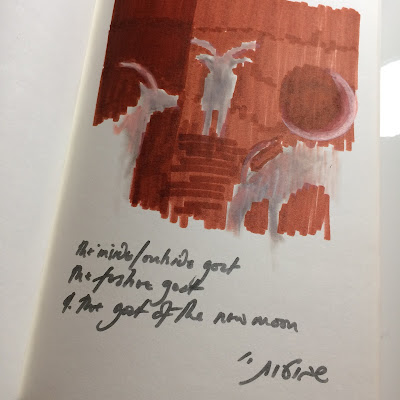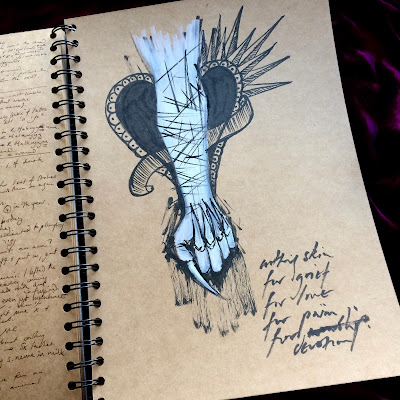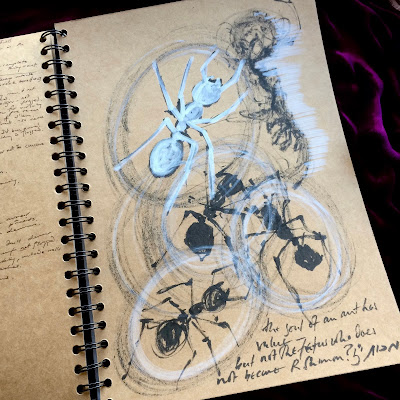what to do with leftovers?
serve as dessert?
or leave to graze?
daf yomi is the discipline of learning a page of Talmud a day. draw yomi is an on-line project to follow the daf yomi cycle and to respond each day with a drawing.
Sunday, 10 December 2017
Saturday, 9 December 2017
Friday, 8 December 2017
Thursday, 7 December 2017
Wednesday, 6 December 2017
Tuesday, 5 December 2017
Monday, 4 December 2017
Sunday, 3 December 2017
Saturday, 2 December 2017
shevuot 4
the written word expands, contracts, and goes into detail.
the spoken word, once fixed in place, is immoveable.
the spoken word, once fixed in place, is immoveable.
Friday, 1 December 2017
shevuot 3
being flogged for not acting?
- so perhaps be careful about what you say about your past,
and promise about your future.
- so perhaps be careful about what you say about your past,
and promise about your future.
Thursday, 30 November 2017
Wednesday, 29 November 2017
makkot 24
while there are those around who are old enough to remember the essential values on which the 613 are built, then there is hope for the future after the destruction.
Makkot closes with a discussion about how the 613 mitzvot of torah can be built from essential principles - either 11, 6, 3, 2, or 1. It also has the conversation between R. Akiva and some other Rabbis who are witnessing the rise of Rome and the destruction of the Temple in Jerusalem. The Rabbis weep while R. Akiva laughs. He explains his laughter, as if the destruction which was prophesied happened, then so too will the renewal and rebuilding. There will be old people sitting in the streets of Jerusalem. The verse quoted cites both old men and old women, they will be the ones who hold the memory of how to reconstruct the torah. Perhaps it is a sign of my getting older, that I love that it is the presence of the old people who are symbol of hope. Too much importance is placed on the potential of youth and the future. And while they are important, the value of older generations are too often ignored and disrespected. So I have drawn two elder women, sorting it all out.
Tuesday, 28 November 2017
Monday, 27 November 2017
Sunday, 26 November 2017
Saturday, 25 November 2017
Friday, 24 November 2017
makkot 19
how can we eat once the place of our eating has gone?
let the food rot and the words go unsaid.
blood has been spilled, so it will not be sprinkled.
the building has been burnt, so the smoke will no longer rise to heaven.
let the food rot and the words go unsaid.
blood has been spilled, so it will not be sprinkled.
the building has been burnt, so the smoke will no longer rise to heaven.
Thursday, 23 November 2017
Wednesday, 22 November 2017
Tuesday, 21 November 2017
Monday, 20 November 2017
Sunday, 19 November 2017
Saturday, 18 November 2017
Friday, 17 November 2017
makkot 12
no asylum for angels, only for people.
who can repent and confess.
Who can accept public honours, once they can accept and publicly admit to the past.
no hiding.
Every so often daf yomi feels so relevant. Today in daf yomi, discusses someone who has killed accidentally, and is exiled to a city of refuge, can accept a public honour only once they have made a public statement that they are a murderer. And the public know that they are a murderer, and still want to honour them. There is something powerful here about atonement and turning one's life around. Earlier on in the page is a comment that the cities of refuge are for people only. Not angels. Angels cannot change their nature. But people potentially can. if they do genuine repentance, which involves confession. I note that the case discussed in the talmud is when the public want to honour someone. Not someone who is seeking honour. (and this is referring to someone who has killed unintentionally. so it is tricky to extrapolate to other transgressions that have an aspect of intentionality to them)
who can repent and confess.
Who can accept public honours, once they can accept and publicly admit to the past.
no hiding.
Every so often daf yomi feels so relevant. Today in daf yomi, discusses someone who has killed accidentally, and is exiled to a city of refuge, can accept a public honour only once they have made a public statement that they are a murderer. And the public know that they are a murderer, and still want to honour them. There is something powerful here about atonement and turning one's life around. Earlier on in the page is a comment that the cities of refuge are for people only. Not angels. Angels cannot change their nature. But people potentially can. if they do genuine repentance, which involves confession. I note that the case discussed in the talmud is when the public want to honour someone. Not someone who is seeking honour. (and this is referring to someone who has killed unintentionally. so it is tricky to extrapolate to other transgressions that have an aspect of intentionality to them)
Thursday, 16 November 2017
makkot 11
WHEN DOES IT ALL END? harsh words & curses, rebuking silence, and the exiles that only end in death and restless bones.
Wednesday, 15 November 2017
Tuesday, 14 November 2017
makkot 9
from before the beginning there was intentional planning in the land's infrastructure for unintentional accidents.
but ignorance is no defence.
but ignorance is no defence.
Monday, 13 November 2017
Sunday, 12 November 2017
makkot 7
the path to exile begins by going down. & if you want a 2nd chance, then go up
(exile is the punishment for unintentional murder, but one is only exiled if one has caused death by a downward motion. This is contrasted earlier in the page about the accused flee after the verdict but before execution. If they go from Eretz Israel to outside, no need for a retrial if the original witnesses are known. If go to Israel, then do need to do a retrial. And thus setting a pattern of perpetrators running to Israel for mercy...)
(exile is the punishment for unintentional murder, but one is only exiled if one has caused death by a downward motion. This is contrasted earlier in the page about the accused flee after the verdict but before execution. If they go from Eretz Israel to outside, no need for a retrial if the original witnesses are known. If go to Israel, then do need to do a retrial. And thus setting a pattern of perpetrators running to Israel for mercy...)
Saturday, 11 November 2017
Friday, 10 November 2017
makkot 5
what's likely to happen, is what we expect to happen
so, once she's known to hire liars, can't trust anyone she brings along.
so, once she's known to hire liars, can't trust anyone she brings along.
Thursday, 9 November 2017
Wednesday, 8 November 2017
makkot 3
what can't cancel what
- the debt can't be cancelled by the 7th
- the pure water can't be cancelled by diluted wine
- and the shirt can't be broken open on shabbat
- the debt can't be cancelled by the 7th
- the pure water can't be cancelled by diluted wine
- and the shirt can't be broken open on shabbat
Tuesday, 7 November 2017
Friday, 21 July 2017
sanhedrin 5
who can judge & teach?
those who get permission from their teacher.
Provided they don't know too much, and are blemished.
It is speculated that Rav does not have Rebbe's permission to rule on blemishes found in 1stborn animals, as he is too much of an expert and would permit things that others would forbid. and the untrained eye would not be able to discern the difference, and thus standards would fall... alternatively there could be better teachers out there, teaching accurately so that the community is not kept in ignorance.
Many, many connections to be made about who is a judge, who teaches torah and who decides halacha today...
those who get permission from their teacher.
Provided they don't know too much, and are blemished.
It is speculated that Rav does not have Rebbe's permission to rule on blemishes found in 1stborn animals, as he is too much of an expert and would permit things that others would forbid. and the untrained eye would not be able to discern the difference, and thus standards would fall... alternatively there could be better teachers out there, teaching accurately so that the community is not kept in ignorance.
Many, many connections to be made about who is a judge, who teaches torah and who decides halacha today...
Thursday, 20 July 2017
Wednesday, 19 July 2017
Tuesday, 18 July 2017
Monday, 10 April 2017
bava batra 78

what is the role of a donkey?
for riding?
for carrying?
to produce and nurture more donkeys?
or to be a warning to the arrogant ones headed for hell?
bava batra 77

when the abstract defines the physical.
words acquire words,
and money determines what is for sale.
Sunday, 9 April 2017
Friday, 7 April 2017
bava batra 75
the ship of future dreams.
following the discussion about the legendary aspects of the sea, including the Levithan, this page explores various visions of the future, including what will happen to the Levithan, Jerusalem, and the stature of humans. These stories finish, and the talmud picks up the original mishna topic - how to buy a ship. And the need for the acquisition to be completed by an action of pulling. It brought to mind that all these future dreams and wishes are bundled together, and can only be kept alive by the scholars and dreamers pulling them into the future.
following the discussion about the legendary aspects of the sea, including the Levithan, this page explores various visions of the future, including what will happen to the Levithan, Jerusalem, and the stature of humans. These stories finish, and the talmud picks up the original mishna topic - how to buy a ship. And the need for the acquisition to be completed by an action of pulling. It brought to mind that all these future dreams and wishes are bundled together, and can only be kept alive by the scholars and dreamers pulling them into the future.
Thursday, 6 April 2017
bava batra 74
travellers' tales
of what happened at sea,
in the desert,
where hell meets earth,
and where earth meets heaven,
and the mighty creatures who live,
and died, there.
basically, everyone is a bit of bore, prone to exaggeration, when they come back from travelling. The talmudic rabbis were no exception.
of what happened at sea,
in the desert,
where hell meets earth,
and where earth meets heaven,
and the mighty creatures who live,
and died, there.
basically, everyone is a bit of bore, prone to exaggeration, when they come back from travelling. The talmudic rabbis were no exception.
Wednesday, 5 April 2017
bava batra 73
tall tales of big fish,
big trees,
big snakes, frogs, birds
and juggling demons.
all inspired by the big waves of the sea.
Discussion about the laws of buying ships, and what is included, leads to many stories about the sea. Each one more fantastic than the last. It's a talmudic rabbis story slam. For me the winner was Rabba and his tale of the demon Hurmin, the son of Lilith, juggling wine and dancing on bridges.
big trees,
big snakes, frogs, birds
and juggling demons.
all inspired by the big waves of the sea.
Discussion about the laws of buying ships, and what is included, leads to many stories about the sea. Each one more fantastic than the last. It's a talmudic rabbis story slam. For me the winner was Rabba and his tale of the demon Hurmin, the son of Lilith, juggling wine and dancing on bridges.
Tuesday, 4 April 2017
Monday, 3 April 2017
bava batra 71
unspecified gifts and particular sales.
- so there's no need to go into detail when giving things to God.
- so there's no need to go into detail when giving things to God.
Sunday, 2 April 2017
Saturday, 1 April 2017
bava batra 69
significant trees,
watchtowers,
and stones.
does buying a field include items within it that have their own identity and significance?
watchtowers,
and stones.
does buying a field include items within it that have their own identity and significance?
Friday, 31 March 2017
Thursday, 30 March 2017
bava batra 67
selling property or the use of the property.
like glass made of grains of sand,
courtyards, olive-presses, and bathhouses, are comprised of different parts.
Some essential to use. and some not.
what is and isn't implicitly included in the sale of courtyards, olive-presses, and bathhouses. The space themselves? fixed items attached to the ground? or the things that give that space it's function?
like glass made of grains of sand,
courtyards, olive-presses, and bathhouses, are comprised of different parts.
Some essential to use. and some not.
what is and isn't implicitly included in the sale of courtyards, olive-presses, and bathhouses. The space themselves? fixed items attached to the ground? or the things that give that space it's function?
Subscribe to:
Comments (Atom)






































 acquiring a ship by pulling.
acquiring a ship by pulling. 







